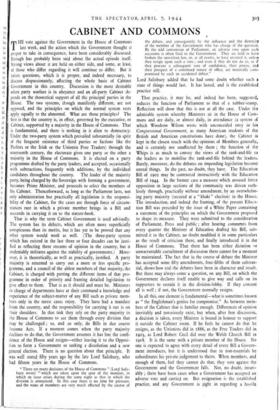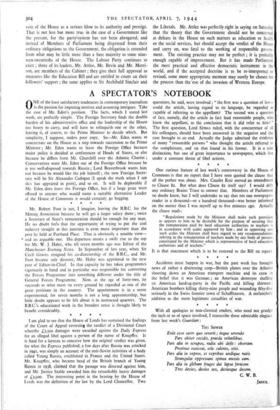CABINET AND COMMONS
THE vote against the Government in the House of Commons last week, and die action which the Government thought it proper to take in consequence, have been considerably discussed. Enough has probably been said about The actual episode itself. Strong views about it are held on either side, and some, at least, of those who differ regarding it will continue to differ. But it raises questions, which it is proper, and indeed necessary, to discuss dispassionately, affecting the whole basis of Cabinet Government in this country. Discussion is the more desirable when party warfare is in abeyance and an all-party Cabinet de- pends on the theoretical support of all the principal parties in the House. The two systems, though manifestly different, are not opposed, and the principles on which the normal system rests apply equally to the abnormal. What are those principles? The first is that the country is, in effect, governed by the executive, or Cabinet, supported by a majority in the House of Commons. That is fundamental, and there is nothing in it alien to democracy. Under the two-party system which prevailed substantially (in spite of the frequent existence of third parties or factions like the Peelites or the Irish or the Unionist Free Traders) through the nineteenth century, the electorate gives one party or the other a majority in the House of Commons. It is elected on a party programme drafted by the party leaders, and accepted, occasionally with subtractions, frequently with additions, by the individual candidates throughout the country. The leader of the majority party, being charged by the Sovereign with forming a government, becomes Prime Minister, and proceeds to select the members of his Cabinet. Thenceforward, as long as the Parliament lasts, not only administration but practically all legislation is the responsi- bility of the Cabinet, for the cases are through force of circum- stances rare in which a private member brings in a Bill and succeeds in carrying it on to the statute-book.
That is why the term Cabinet Government is used advisedly. The system has its defects, which are often more superficially conspicuous than its merits, but it has yet to be proved that any other system would work as well. (The three-party system which has existed in the last three or four decades can be justi- fied as reflecting three streams of opinion in the country, but it undeniably militates against the stability of governments.) More- over, it is theoretically, as well as practically, justified. A party majority is returned to carry out a more or less specific pro- gramme, and a council of the ablest members of that majority, the Cabinet, is charged with putting the different items of that pro- gramme in order of priority and framing detailed legislation to give effect to them. That is as it should and must be. Ministers in charge of departments have at their command a knowledge and experience of the subject-matter of any Bill such as private mem- bers only in the rarest cases enjoy. They have had a mandate from the country, and the responsibility for carrying it out is on their shoulders. In that task they rely on the party majority in the House of Commons to see them through every division that may be challenged ; so, and so only, do Bills in due course become Acts. If a moment comes when the party majority declines to do that, the Government assumes it has lost the confi- dence of the House and resigns—either leaving it to the Opposi- tion to form a Government or seeking a dissolution and a new general election. There is no question about that principle. It was well stated fifty years ago by the late Lord Salisbury, who had fifteen years in the House of Commons.
" There are many decisions of the House of Commons " (Lori! Salis- bury wrote) " which are taken upon the spur of the moment, in which an issue arises during the same night as that in which the division is announced. In this case there is no time for pressure, and the votes of members are very much affected by the course of the debate, and consequently by the influence and the dexterity of the member of the Government who has charge of the question. By the odd convention of Parliament, an adverse vote upon such occasions is often fatal to the Government. They are held to have broken the unwritten law, or, at all events, to have strained it, unless they resign upon such a vote ; and even if they do not do so, or if they procure a subsequent vote of confidence, their power, and their prospect of a continued tenure of office, are materially com- promised by such an accidental defeat."
Lord Salisbury added that he had some doubt whether such a state of things would last. It has lasted, and is the established practice still.
That practice, it may be, and indeed has been, suggested, reduces the function of Parliament to that of a rubber-stamp. Reflection will show that this is not at all the case. Under the admirable system whereby Ministers sit in the House of Com- mons and are daily, or almost daily, in attendance (a system of which Woodrow Wilson wrote with unconcealed envy in his Congressional Government, as many American students of the British and American constitutions have done), the Cabinet is kept in the closest touch with the opinions of Members generally, and is certainly not unaffected by them ; the function of the Whips is as much to convey the views of the rank-and-file to the leaders as to mobilise the rank-and-file behind the leaders. Rarely, moreover, do the debates on impending legislation become unreal things. In the past, no doubt, they have. The Education Bill of 1902 may be contrasted instructively with the Education Bill of 1944. In the former case a measure which aroused bittet opposition in large sections of the community was driven ruth- lessly through, practically without amendment, by an overwhelm- ing party majority (secured at a " khaki " election) in the House. The introduction, and indeed the framing, of the present Educa- tion Bill was preceded by the issue of a White Paper containing a statement of the principles on which the Government proposed to shape its measure. They were submitted to the consideration of Parliament, Press and public ; after hearing comments from every quarter the Minister of Education drafted his Bill, sub- mitted it to the Cabinet, no doubt modified it in some particulars as the result of criticism there, and finally introduced it in the House of Commons. That there has been either dictation or unwarrantable curtailment of discussion there cannot for a moment be maintained. The fact that in the course of debate the Minister has accepted some fifty amendments, four-fifths of them substan- tial, shows how real the debates have been in character and result. But there may always come a question, on any Bill, on which the Government declares itself unable to give way and calls on its supporters to sustain it in the division-lobby. If they consent all is well ; if not, the Government normally resigns.
In all this, one element is fundamental—what is sometimes known as " the Englishman's genius for compromise." As between mem- bers of the Cabinet that is familiar enough. Differences of opinion inevitably and notoriously exist, but when, after free discussion, a decision is taken, every Minister is bound in honour to support it outside the Cabinet room. If he feels he cannot do that he resigns, as the Unionists did in 1886, as the Free Traders did in 1903, as Lord Robert Cecil did over the Welsh Church Bill in 1918. It is the same with a private member of the House. No one is expected to agree with every detail of every Bill a Govern- ment introduces, but it is understood that in non-essentials he subordinates his private judgement to theirs. When members, and enough of them, feel they cannot do that, they vote against the Government and the Government falls. Not, no doubt, invari- ably ; there have been cases when a Government has accepted an adverse vote and carried on. But resignation is the established practice, and any Government is right in regarding a hostile vote of the House as a serious blow to its authority and prestige. That is not less but more true in the case of a Government like the present, for the party`-system has not been abrogated, and instead of Members of Parliament being dispensed from their ordinary obligations to the Government, the obligation is extended from what may be little more than a bare majority to some nine- teen-twentieths of the House. The Labour Party continues to exist ; t,hree of its leaders, Mr. Attlee, Mr. Sevin and Mr. Morri- son, are members of the Cabinet ; they give their full approval to measures like the Education Bill and are entitled to count on their followers' support ; the same applies to Sir Archibald Sinclair and the Liberals. Mr. Attlee was perfectly right in saying on Saturday that the theory that the Government should not be concerned at defeats in the House on such matters as education or health or the social services, but should accept the verdict of the House and carry on, was fatal to the working of respoosible govern- ment. The existing practice may not be perfect ; it is probably enough capable of improvement. But it has made Parliament the most practical and effective democratic instrument in the world, and if the accepted doctrine is to. be re-interpreted or revised, some more appropriate moment may surely be chosen for the process than the'eve of the invasion of Western Europe.



























 Previous page
Previous page